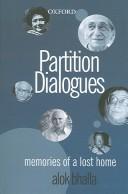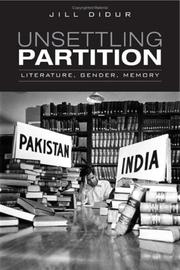| Listing 1 - 5 of 5 |
Sort by
|
Book
ISBN: 8131714160 Year: 2008 Publisher: New Delhi : Dorling Kindersley (India),
Abstract | Keywords | Export | Availability | Bookmark
 Loading...
Loading...Choose an application
- Reference Manager
- EndNote
- RefWorks (Direct export to RefWorks)
Indic literature --- Partition, Territorial, in literature. --- Political refugees in literature. --- Inde --- Littérature indienne (de l'Inde) --- History and criticism. --- 1947 (Partition) --- 20e siècle --- India --- History --- Influence. --- Histoire et critique --- Littérature indienne (de l'Inde) --- 20e siècle

ISBN: 0195677420 Year: 2006 Publisher: New Delhi Oxford : Oxford University Press,
Abstract | Keywords | Export | Availability | Bookmark
 Loading...
Loading...Choose an application
- Reference Manager
- EndNote
- RefWorks (Direct export to RefWorks)
This volume is a collection of interviews with notable writers who have lived through the Partition and have represented it in their fiction. Writers like Bhisham Sahni, Krishna Sobti, Kamleshwar, Krishna Baldev Vaid, Bapsi Sidhwa, and Intizar Husain present a host of insights not always included in their work. Bhalla extensive introduction introduces the idea of home and freedom, and how the two are interlinked.
Écrivains indiens (de l'Inde) --- Romanciers indiens (de l'Inde) de langue anglaise --- Littérature indienne (de l'Inde) de langue anglaise --- Littérature pakistanaise de langue anglaise --- Conflit indo-pakistanais (1947-1949) --- Inde --- Entretiens --- 20e siècle --- 1945-.... --- Récits personnels --- 1947 (Partition) --- Histoire et critique --- Dans la littérature

ISBN: 1281997714 9786611997717 1442682957 9781442682955 9781281997715 0802079970 9780802079978 1442638257 1442615052 Year: 2006 Publisher: Toronto [Ont.] University of Toronto Press
Abstract | Keywords | Export | Availability | Bookmark
 Loading...
Loading...Choose an application
- Reference Manager
- EndNote
- RefWorks (Direct export to RefWorks)
"The Partition of India in 1947 marked the birth of two modern-nation states and the end of British colonialism in South Asia. The move towards the 'two nation solution' was accompanied by an unprecedented mass migration (over twelve million people) to and from areas that would become India and Pakistan." "Diverse representations of the violence that accompanied this migration (including the abduction and sexual assault of over 75,000 women) can be found in fictional, historical, autobiographical, and scholarly works. Unsettling Partition examines short stories, novels, testimonies, and historiography that represent women's experiences of the Partition."--Jacket.
Indic fiction --- Partition, Territorial, in literature. --- Gender identity in literature. --- Violence in literature. --- Nationalism in literature. --- Women in literature. --- Woman (Christian theology) in literature --- Women in drama --- Women in poetry --- History and criticism. --- India --- History --- Roman indien (de l'Inde) de langue anglaise --- Littérature indienne (de l'Inde) de langue anglais --- Inde --- Démembrement des nations --- Identité sexuelle --- Violence --- Nationalisme --- Femmes --- 20e siècle --- Histoire et critique --- Thèmes, motifs --- 1947 (Partition) --- Dans la littérature
Book
ISBN: 1283277409 9786613277404 0520948009 9780520948006 9781283277402 6613277401 9780520266773 0520266773 Year: 2010 Publisher: Berkeley
Abstract | Keywords | Export | Availability | Bookmark
 Loading...
Loading...Choose an application
- Reference Manager
- EndNote
- RefWorks (Direct export to RefWorks)
Beginning in 1947, when "India and Pakistan were born to conflict," renowned India scholar Stanley Wolpert provides an authoritative, accessible primer on what is potentially the world's most dangerous crisis. He concisely distills sixty-three years of complex history, tracing the roots of the relationship between these two antagonists, explaining the many attempts to resolve their disputes, and assessing the dominant political leaders. While the tragic Partition left many urgent problems, none has been more difficult than the problem over Kashmir, claimed by both India and Pakistan. This intensely divisive issue has triggered two conventional wars, killed some 100,000 Kashmiris, and almost ignited two nuclear wars since 1998, when both India and Pakistan openly emerged as nuclear-weapon states. In addition to providing a comprehensive perspective on the origin and nature of this urgent conflict, Wolpert examines all the proposed solutions and concludes with a road map for a brighter future for South Asia.
History. --- India --- Pakistan --- Foreign relations --- Military relations --- 1947 partition. --- afghanistan. --- azaadi. --- bangladesh. --- british colonialism. --- coup. --- diplomacy. --- empire. --- gandhi. --- hate. --- hinduism. --- history of pakistan and india. --- history. --- india. --- indian parliament. --- indo pakistani war. --- islam. --- jammu. --- kashmir. --- nonfiction. --- nuclear conflict. --- nuclear strikes. --- nuclear war. --- nuclear weapons. --- pakistan. --- pandits. --- partition. --- peace. --- political science. --- raj. --- rape. --- religion. --- religious sects. --- religious war. --- revolution. --- sikh. --- simla summit. --- social issues. --- south asia. --- south asian history. --- suicide bombing. --- terrorism. --- war crimes. --- war. --- zia.
Book
ISBN: 9786613852434 1400845491 1283539985 9781400845491 9781283539982 9780691137698 0691137692 9780691137681 0691137684 Year: 2012 Publisher: Princeton, N.J. : Princeton University Press,
Abstract | Keywords | Export | Availability | Bookmark
 Loading...
Loading...Choose an application
- Reference Manager
- EndNote
- RefWorks (Direct export to RefWorks)
The Soldier and the Changing State is the first book to systematically explore, on a global scale, civil-military relations in democratizing and changing states. Looking at how armies supportive of democracy are built, Zoltan Barany argues that the military is the most important institution that states maintain, for without military elites who support democratic governance, democracy cannot be consolidated. Barany also demonstrates that building democratic armies is the quintessential task of newly democratizing regimes. But how do democratic armies come about? What conditions encourage or impede democratic civil-military relations? And how can the state ensure the allegiance of its soldiers? Barany examines the experiences of developing countries and the armed forces in the context of major political change in six specific settings: in the wake of war and civil war, after military and communist regimes, and following colonialism and unification/apartheid. He evaluates the army-building and democratization experiences of twenty-seven countries and explains which predemocratic settings are most conducive to creating a military that will support democracy. Highlighting important factors and suggesting which reforms can be expected to work and fail in different environments, he offers practical policy recommendations to state-builders and democratizers.
Armed Forces --- Civil-military relations --- Armed Services --- Military, The --- Military art and science --- Disarmament --- Military and civilian power --- Military-civil relations --- Executive power --- Sociology, Military --- Military government --- Reorganization --- 1947 Partition. --- Argentina. --- Bangladesh. --- Bosnia and Herzegovina. --- Botswana. --- British colonial rule. --- Chile. --- Cold War. --- El Salvador. --- European Union. --- Germany. --- Ghana. --- Greece. --- Guatemala. --- Hezbollah. --- Hungary. --- India independence. --- Indonesia. --- Japan. --- Lebanese Armed Forces. --- Lebanese civil war. --- NATO. --- Pakistan independence. --- Portugal. --- Portuguese civilЭilitary relations. --- Romania. --- Royal Thai Armed Forces. --- Russia. --- Russian military politics. --- Shi'a Islamist organization. --- Slovenia. --- South Africa. --- South Korea. --- Soviet Union. --- Spain. --- Spanish military. --- Tanzania. --- Territorial Defense Force. --- Thailand. --- Yemen. --- apartheid. --- armed forces. --- army building. --- authoritarianism. --- civil war. --- civilian control. --- civilЭilitary relations. --- civiЭilitary relations. --- colonialism. --- communism. --- communist regime. --- consolidated democracy. --- democracy. --- democratic armies. --- democratic army. --- democratic civilЭilitary relations. --- democratic control. --- democratic governance. --- democratic regimes. --- democratic transition. --- democratization. --- democratizing regimes. --- fascist dictatorship. --- formative moments. --- free elections. --- military dictators. --- military elites. --- military politics. --- military rule. --- party-state. --- political autonomy. --- political environments. --- political presence. --- postcommunism. --- postwar Germany. --- praetorian elites. --- praetorianism. --- regime change. --- reunification. --- single political entity. --- state formation. --- state transformation. --- state-builders. --- war.
| Listing 1 - 5 of 5 |
Sort by
|

 Search
Search Feedback
Feedback About UniCat
About UniCat  Help
Help News
News